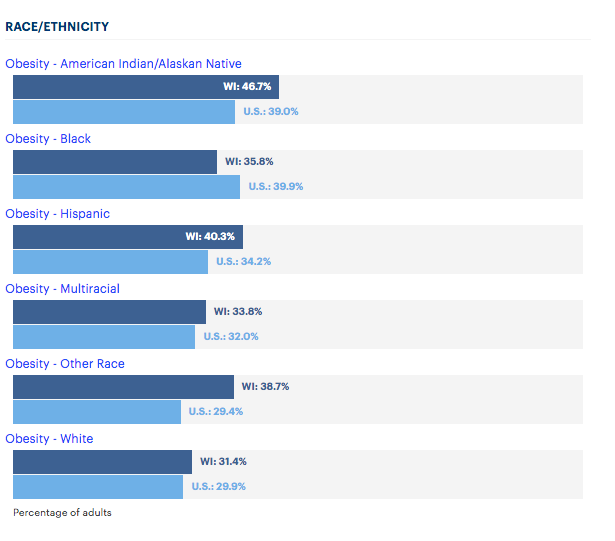
Special promotional content from the University of Wisconsin School of Madison and Public Health:
 According to the Wisconsin Department of Health Services, in 2018, 67% of Wisconsin adults could be classified as having overweight or obesity. While this rate is similar to the national average, there are important differences among sections of the population. For example, people living in rural areas have higher rates of obesity (67%) compared to those living in more urban areas like Madison’s west side (16%). In Wisconsin, 36% of Black, 40% of Latinx and 47% American Indian adults are at risk for obesity compared to 31% of White adults. Obesity is among the leading causes of preventable deaths in the United States. Excess body weight can decrease quality of life and put people at risk for developing many health problems, especially high blood pressure, heart disease, stroke, type 2 diabetes, and chronic pain. Losing 5- 10% of body weight, and maintaining that weight loss, can reduce these health risks and improve quality of life.
According to the Wisconsin Department of Health Services, in 2018, 67% of Wisconsin adults could be classified as having overweight or obesity. While this rate is similar to the national average, there are important differences among sections of the population. For example, people living in rural areas have higher rates of obesity (67%) compared to those living in more urban areas like Madison’s west side (16%). In Wisconsin, 36% of Black, 40% of Latinx and 47% American Indian adults are at risk for obesity compared to 31% of White adults. Obesity is among the leading causes of preventable deaths in the United States. Excess body weight can decrease quality of life and put people at risk for developing many health problems, especially high blood pressure, heart disease, stroke, type 2 diabetes, and chronic pain. Losing 5- 10% of body weight, and maintaining that weight loss, can reduce these health risks and improve quality of life.
Many social and environmental factors contribute to someone’s ability to maintain a healthy diet, including whether they have regular access to healthy food. Adults with low household income are significantly more likely to have excess weight compared to middle- or high-income adults. Residents of low income neighborhoods are less likely to have a grocery store near their home and may instead have to rely on fast food restaurants and/or convenience stores for food, which often lack healthy options. Even within the Madison community, different zip codes have very different health needs due to the varying access to healthy foods or recreation opportunities. While researchers have studied the factors that may impact weight and loss, including income level, access to education and employment, much less is known about the presence of supportive social networks. Researchers at the University of Wisconsin are interested in learning more about the role of domestic partners in maintaining weight loss and lifestyle changes.

We know our eating and physical activity behaviors often are influenced by the people closest to us. The Partner2Lose research study is attempting to learn whether involving a person’s significant other helps or hinders the weight loss/weight loss maintenance process. The study provides nutrition and exercise education that covers a variety of topics. Couples enrolled into the two-year study will be assigned to participate in nutrition education classes with an optional guided exercise session, and phone calls with their partner; or they will be assigned to participate in the classes and phone calls on their own. All couples will be weighed and fill out surveys every six months, and will be compensated. We understand that there is no “one-size-fits-all” approach to health and wellness. We want to provide you with education and resources to be able to make the best choices for yourselves and your families.
Our mission is to give people access to resources to help them make lifestyle changes to reduce their chances of developing preventable diseases and improve their quality of life. Starting with the basics of label reading and SMART goal-setting, we discuss meal planning, healthy dining-out strategies, and explore the psychology behind mindful and emotional eating. Each class topic and corresponding materials can be tailored to fit your lifestyle and budget. The virtual group classes offer the opportunity to develop a sense of community and social support with other participants from different backgrounds over the first six months of the study. Classes and phone calls are facilitated by an interdisciplinary team of health professionals who provide appropriate modifications and personalized support for each participant and their partner.
Lead Researcher Corrine Voils says, “The inspiration for this research comes from seeing my parents and friends struggle with diseases that are caused, or made worse, by an unhealthy lifestyle. While there are many underlying factors, I am always curious about what makes some people decide to adopt a healthy lifestyle, and what makes others feel like there is no hope. I hope that my research will help people in our community learn ways to make healthier choices a permanent part of their lifestyle.” Our vision is to be a leader in providing evidence-based tools to build sustainable, healthy habits for people in Wisconsin and beyond. Interested in seeing if you and your partner qualify? Go to Partner2Lose.com to complete an online screening form and for more information including virtual class days/times and COVID-19 mental health resources.



